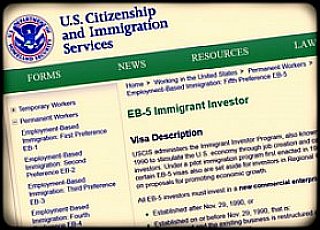Update: The U.S. Supreme Court announced on November 1 that it will hear the case, presumably during this term. Should the Securities and Exchange Commission be over-ruled it would be a setback for those seeking to reform the EB-5 program.

It is only partially because I love the term "disgorgement" (meaning a forced return of ill-gotten gains) that I report that a case involving both disgorgement and an EB-5 scandal may get to the U.S. Supreme Court in the coming months.
The other reason for writing about this case is that the sum at issue, $35 million, illustrates the potential size of EB-5 scams. The couple involved in the case, Charles Liu and Xin Wang, had to do in 70 alien families, probably Chinese, in order to raise that much money, as we reported previously.
I generally don't write about single EB-5 court cases more than once on the grounds that I do not want to appear to be more biased against the program than I am and, besides, there are so many of these EB-5 scandals, often involving Chinese-American schemers and alien Chinese victims, that they become a bit of a blur. (EB-5-related green card visas are issued to alien families who pony up half a million dollars in a DHS-approved, but not guaranteed investment.)
The Liu and Wang case has already created double coverage by CIS, because not only did the federal courts (egged on by the Securities and Exchange Commission) find that the EB-5 funds had never been used for the promised cancer treatment center in southern California, but that Liu had also purchased citizenship from Grenada, a small, ex-British Caribbean island nation. (Perhaps he used funds from one visas-for-sale scheme to buy into another such arrangement, in another nation.)
It's not that there is any remaining question about who did what to whose EB-5 investments; that has been settled by a federal district court and was supported, on appeal, by the Ninth Circuit.
The issue, which may or may not make it to the Supreme Court, is whether or not the government has the power that SEC thinks it has to force the disgorgement of the misused funds.
Will the high court grant certification (i.e., agree to accept the case)? If so, what will it decide? CIS readers will be kept informed.
